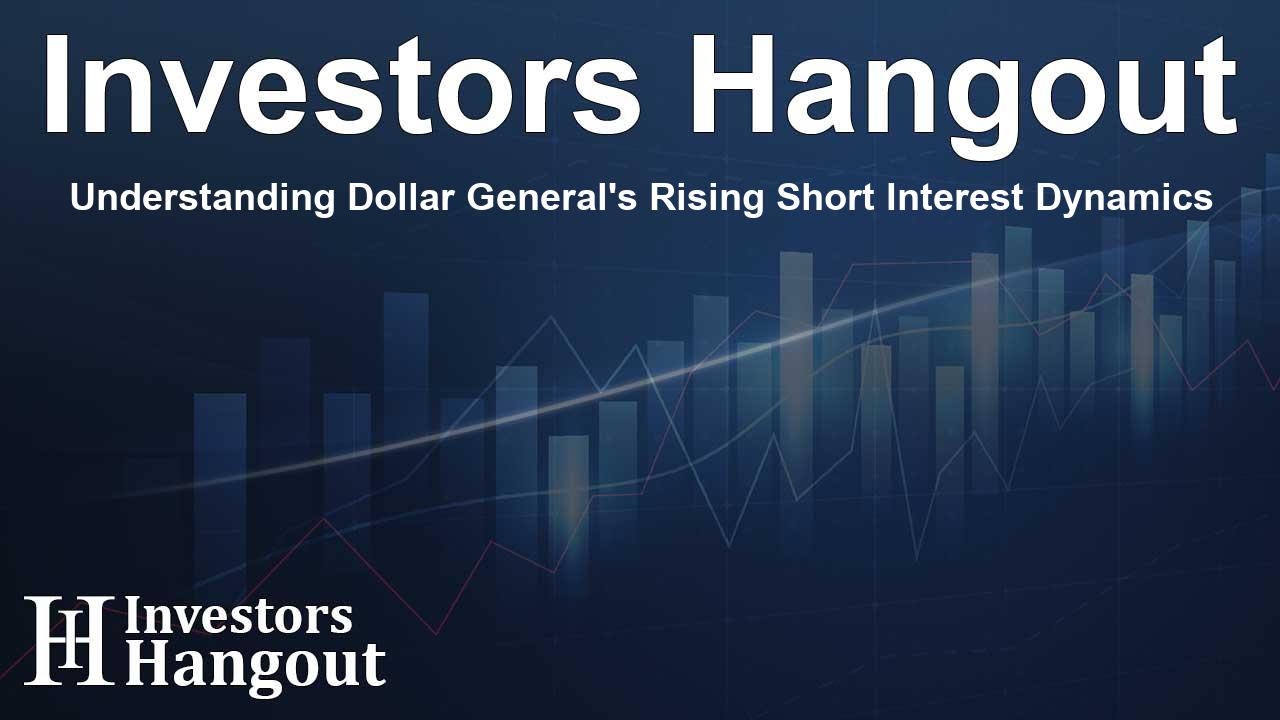Understanding Dollar General's Rising Short Interest Dynamics

Insights into Dollar General's Short Interest Trends
Dollar General (NYSE: DG) has recently seen a notable increase in its short interest, rising by 7.67%. As reported, there are currently 6.55 million shares sold short, representing 3.37% of all tradable shares. Given the trading volume, it would take approximately 1.69 days for traders to cover these short positions on average.
Understanding Short Interest and Its Significance
What is Short Interest?
Short interest refers to the total number of shares that have been sold short but remain open positions—that is, they haven't been bought back yet. When traders engage in short selling, they sell shares they do not actually own, with the intention of repurchasing them later at a lower price. If the stock price does not fall as expected, they may incur losses, making it crucial for traders to watch short interest trends closely.
Why Tracking Short Interest is Important
Monitoring short interest is vital because it often reflects market sentiment regarding a stock. A rise in short interest can suggest that investors are increasingly pessimistic about the stock's future performance, while a decrease might indicate growing optimism. Therefore, understanding these dynamics can greatly assist investors in making informed decisions.
Dollar General's Recent Short Selling Trends
The latest data shows a clear upward trend in short selling at Dollar General. While this increase does not automatically imply a forthcoming drop in stock value, it is an essential consideration for traders and investors. This surge indicates a growing number of market participants betting against the stock, signaling caution around its future performance.
Charting Dollar General's Short Interest
Recent comparisons highlight the percentage of Dollar General's shares being sold short, showcasing an increase since the last reporting period. Such visual representations can enhance understanding of market movements and investor behavior.
How Dollar General Compares to Its Peers
In finance, comparing a company’s performance to its peers can provide essential insights. Dollar General's peer group, which includes companies with similar market characteristics, serves as a benchmark. According to a recent analysis, Dollar General's average short interest as a percentage of its float stands at 3.51%, meaning it has lower short interest compared to many of its peers, which may suggest a relatively more stable outlook.
Implications of Increasing Short Interest
Interestingly, a rise in short interest can sometimes serve as a bullish indicator for a stock. This reflects the potential for a short squeeze, where short sellers are forced to buy shares to cover their positions, potentially driving up the stock price. In certain scenarios, this phenomenon can create profitable trading opportunities.
Conclusion
As the landscape for Dollar General evolves, paying attention to short interest trends will be vital for investors keen on understanding the market’s perspective. Changes in short interest not only reflect investor sentiment but also offer insights into potential trading strategies. With this knowledge, investors can navigate better through the financial markets, using short interest as a tool for informed decision-making.
Frequently Asked Questions
What does an increase in short interest mean for Dollar General?
An increase in short interest suggests that more investors are betting against Dollar General, indicating a bearish sentiment in the market.
Is high short interest always a bad sign?
Not necessarily; high short interest can sometimes lead to a short squeeze, which may result in increased stock prices.
How long would it take for traders to cover their short positions?
Based on recent trading volumes, it would take approximately 1.69 days for traders to cover their short positions in Dollar General.
How does Dollar General's short interest compare to its peers?
Dollar General's short interest is lower than the average of its peers, suggesting a more favorable outlook among investors.
Why is short selling important to monitor?
Monitoring short selling helps investors gauge market sentiment and make informed decisions regarding their investments.
About Investors Hangout
Investors Hangout is a leading online stock forum for financial discussion and learning, offering a wide range of free tools and resources. It draws in traders of all levels, who exchange market knowledge, investigate trading tactics, and keep an eye on industry developments in real time. Featuring financial articles, stock message boards, quotes, charts, company profiles, and live news updates. Through cooperative learning and a wealth of informational resources, it helps users from novices creating their first portfolios to experts honing their techniques. Join Investors Hangout today: https://investorshangout.com/
Disclaimer: The content of this article is solely for general informational purposes only; it does not represent legal, financial, or investment advice. Investors Hangout does not offer financial advice; the author is not a licensed financial advisor. Consult a qualified advisor before making any financial or investment decisions based on this article. The author's interpretation of publicly available data shapes the opinions presented here; as a result, they should not be taken as advice to purchase, sell, or hold any securities mentioned or any other investments. The author does not guarantee the accuracy, completeness, or timeliness of any material, providing it "as is." Information and market conditions may change; past performance is not indicative of future outcomes. If any of the material offered here is inaccurate, please contact us for corrections.